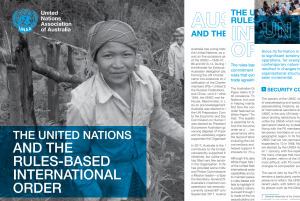
The United Nations Association of Australia has just released an educational special primer paper for policymakers on the critical role of the UN in the “rules-based international order”.
This definitive paper has been co-authored by the Australian Parliamentary Library and UNAA National President, Major General Michael G Smith AO (Ret’d). The paper’s executive summary explains that the value of a “rules-based international order” is a concept gaining increasing currency both in Australia and internationally. This means a shared commitment by all countries to conduct their activities in accordance with agreed rules that evolve over time, such as international law, regional security arrangements, trade agreements, immigration protocols, and cultural arrangements.
As demonstrated since the formation of the United Nations following the Second World War, international cooperation to develop a rules-based international order is the only alternative to international coercion by competing for great powers, spheres of influence, client states and terrorist organisations. Moreover, global development through the achievement of the sustainable development goals (SDGs) can only occur within a rules-based international system based on commitment, cooperation and respect. An effective rules-based international order depends largely on the professionalism and neutrality of the United Nations, and the effectiveness of the United Nations depends mostly on the commitment by its Member States. As a medium power, Australia has a profound interest in promoting multilateral diplomacy and actions to preserve and strengthen the rules-based international order. Foreign Minister Julie Bishop has described the UN as a ‘force multiplier’ for Australia’s national interests.